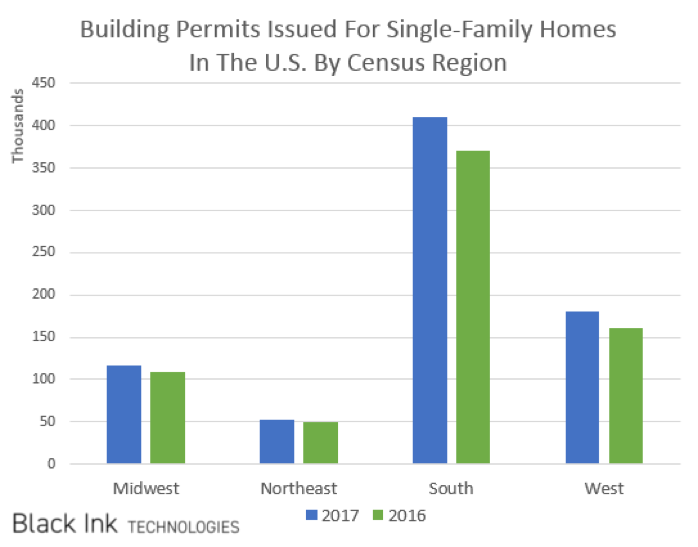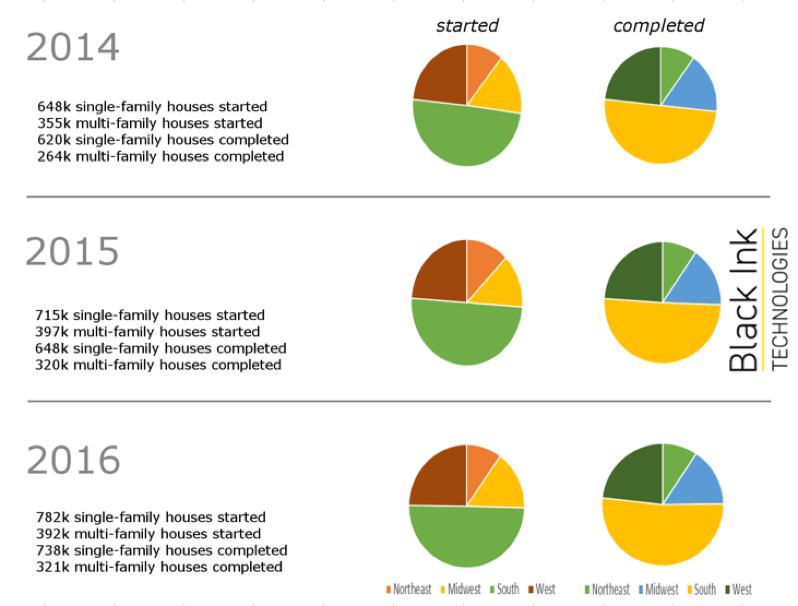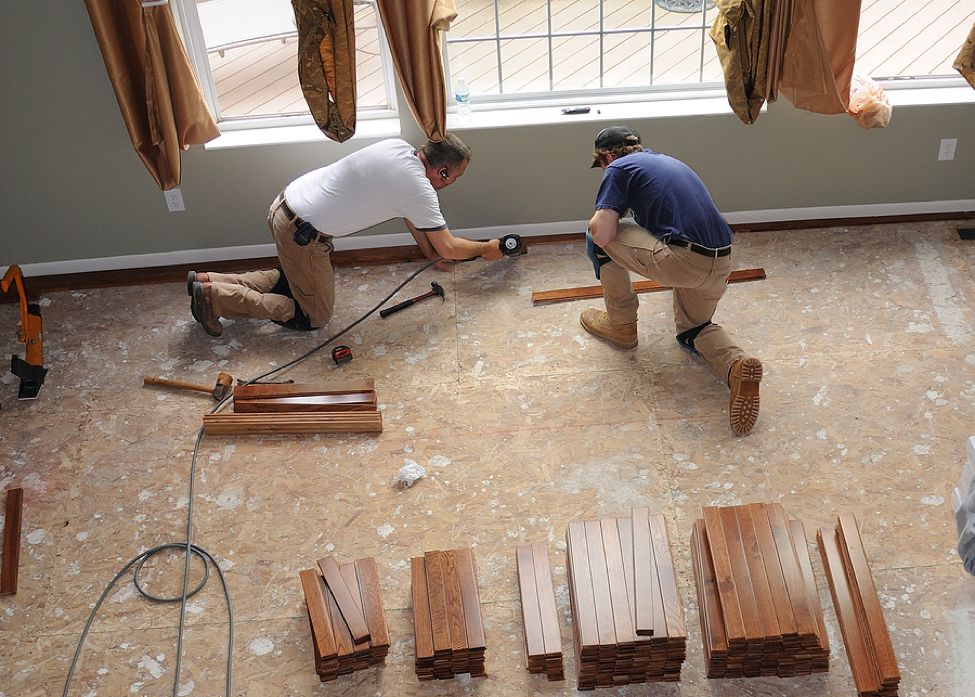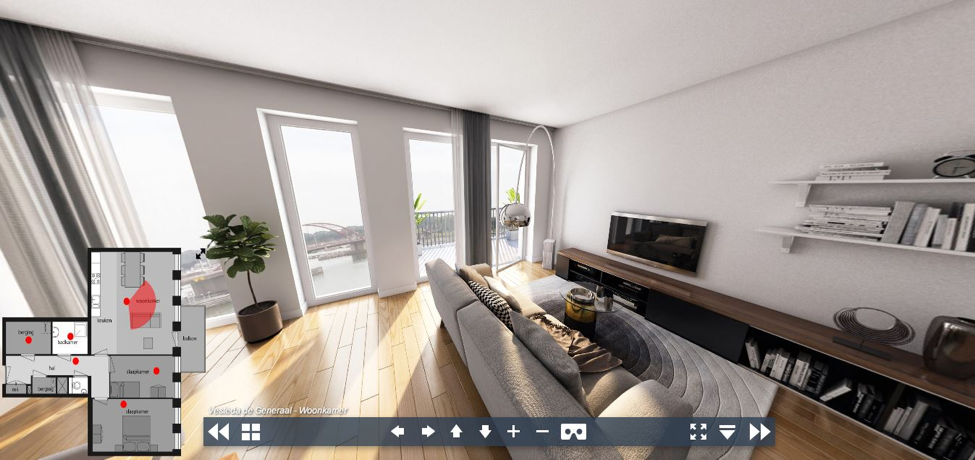4 Industries (Other Than Real Estate) Benefiting From The Rising Housing Market
by Ken Gibson
According to most forecasts, including our own, the US housing market is looking great. For example, we looked at the number of building permits that were issued in 2016 and 2017, and as you can tell from the chart below, their numbers are rising across the board.

We also took a comprehensive look at the number of houses that were started and completed, including single- and multi-family houses, from 2014 to 2016. These numbers are rising too, with the South having the most new houses being built.

So, good news if you’re in the real estate business, but the celebration shouldn’t stop there. As the saying goes, a rising tide lifts all boats. New houses being built means that more people are buying houses, and people who buy houses tend to buy more things than just houses. After all, you can’t do very much with an empty house.
Here are 4 industries that will benefit just as much as the real estate industry from the rising strength of the US housing market.
1. Landscapers
Contrary to popular belief, Millennials are very interested in the suburbs. They are the majority of people buying homes now, which is perhaps why population density in suburbs is growing.
So, more people are preferring the real kind over concrete landscape. Who stands to benefit from this trend? Landscapers, and myriad other professionals in the landscaping industry.

The thing that makes the landscaping industry benefit so much from the rising housing market is that it is multifaceted. There are designers, who make plans for whomever the house belongs to, then there are contractors, who are the ones who build the hardscape and grade the land, then finally there are landscapers, the men and women who maintain the property. Additionally, there are outdoor power equipment dealers who cater to home-owners who want to do the work themselves. The landscaping industry benefits from more than just homebuyers buying new lawn mowers and hedge clippers.
Not to mention, real estate developers invest a ton in making the landscape around the houses they are trying to sell look nice, so that prospective buyers have the best experience while looking at them. Landscaping comes into play before and after a house sells.
With more neighborhoods popping up, there is going to be more battles over who has the best-looking lawn, which is one more reason why profits are going to bloom for the landscaping industry thanks to the rising housing market.
2. Remodelers
One thing you need to know about millennials is that they’re impatient, even when it comes to making big life-changing decisions such as buying a house. A lot of them are skipping buying a “starter” home and going straight to purchasing million-dollar dream homes instead.

This may sound like bad news for sellers of starter homes; however, it often doesn’t take too much work to turn a starter home into a dream home and save/make lots of money in the process. Enter remodelers. With some added rooms, interior decorating, and appliance upgrades a starter home can easily be elevated into the next tier, or possibly the one after that.
With more new homes being added to the market, the pressure is greater for sellers of old homes to renovate. Consequently, remodelers will be seeing a spike in customers.
3. Financial Advisors
Budgets are never going away. Millennials who want to buy their own home, or anyone for that matter, probably need to get their finances in order first, and friends and family can only help them out so much. That’s why financial advisers will gain more clients due to the rising housing market.
Buying a home is only the first step, too – afterwards most homebuyers will have to start worrying about their kid’s college tuition, rainy day funds, retirement, and the list goes on. Buying a home is the starting point for many advisor-client relationships.

Financial advisors today can take a more granular approach, thanks to online banking and mobile payments. Furthermore, lots of companies are now offering face-to-face meetings through FaceTime and other video conferencing apps, since that is what more and more clients are beginning to expect.
Imagine trying to sell your house to someone who has their financial advisor watching and giving advice through their phone. Or, imagine buying a home without taking advantage of that service.
4. Tech Companies
People having difficulty selling their homes will turn to anything for help, and many technology companies are stepping in to fill this need. Thousands of apps, websites, and social networks exist to help sellers contact potential buyers.
On the other side of the coin, buyers are turning to technology to help them find homes. Millennials especially. According to a study done by the National Association of Realtors, 99% of Millennials cited using the Internet as a source for how they found a home to buy, compared to 89% of older Boomers.

One fascinating development is the use of virtual reality to sell homes. Sotheby’s International Realty already does this: an agent books time with a potential client to “walk” them through a 3D, digital representation of a property. This saves everyone time and money, since no one has to travel to the physical location.
Sellers want to close faster, buyers want to find more options, and technology grants them both what they want.
